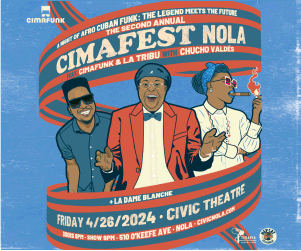Updated: 5:00 p.m., Tuesday, November 27
To celebrate the first public performance of Irvin Mayfield and the New Orleans Jazz Orchestra’s Dirt, Dust and Trees — A Tribute to Literary Legend Ernest Gaines, OffBeat is giving away a pair of tickets to four lucky jazz fans. To enter into the drawing, simply fill out this form. Winners will be notified by noon on Friday, November 30.
Original Post
This Friday, November 30 at the Joy Theater, the New Orleans Jazz Orchestra presents a new work by Irvin Mayfield, “Dirt, Dust and Trees.” The commission is a tribute to noted American author Ernest Gaines, who will be part of the program at the Joy Theater on Canal Street. The show is part of NOJO’s ongoing 10th anniversary celebration.

The Nov. 30 "Tribute to Literary Legend Ernest Gaines" event will feature the premiere of an original jazz score by Irvin Mayfield and NOJO.
“I’ve met with Ernest five times in the last two months,” said Mayfield. “I’ve also been playing the pieces and we’ve had discussions. I’ve also read every book Gaines has written. And to have an opportunity to work with an artist of that level is rich.”
Gaines grew up in a ramshackle building that was a former slave quarters on a plantation in Louisiana’s Pointe Coupee Parish. His antecedents were sharecroppers and he was offered only a rudimentary education in Louisiana, but he continued his studies after his parents moved to California and eventually earned a degree in literature from San Francisco State University. His first novel, Catherine Carmier, was published in 1964. He has since written such classics as The Autobiography of Miss Jane Pittman, In My Father’s House and A Gathering of Old Men. His 1993 novel A Lesson Before Dying won the National Book Critics Circle Award.
“One of the lessons Gaines gave me,” said Mayfield, “he said, ‘There’s more truth in a lie than there is in the truth.’ What he means by that is if you really want to learn something about a society or a place you really have to learn its fiction. There are great historical books. But I think Gaines is correct if you really want to learn about the intent of a man you need a little fiction there. The fiction writers have always stood on top of mountaintops in defense of ideas. What I do for a living is the same thing that a guy who writes fiction does. We basically come up with ideas and it takes time to come up with good ideas. A lot of idea men and women die unrecognized, unappreciated, unsupported. So a guy like Gaines stands in the defense of great ideas, which to some extent may be more powerful than a lie and may be more powerful than the truth because at the end of the day the next powerful idea is going to fuel both of those things. That’s why I do what I do. Working with a guy like Ernest Gaines it gives you a completely different perspective on what it is to be an artist.”
One of Mayfield’s motives in spotlighting Gaines was to draw attention to what he sees as declining standards of literacy. “We live in a society where we are becoming less literate on a daily basis,” he said. “How is that possible with the rash of information we have available to us? Either the information is not accessible or the tools we need to access the information aren’t available. I’m not just talking about technical tools I’m also talking about the intelligence tools that we need. These 3,000 years of written history that we’ve been borrowing from have gotten us far, but I’m a lot more interested in where we’re going to go. I think it’s about those tools and being artistically literate and not confusing that with the idea that reading See Spot Run is being literate.
It’s not about being functionally literate, it’s really about this notion of high culture. In New Orleans, we built high culture that came from the underclass. High culture is really a notion of self. That’s the highest place we can get to, where we can recognize each other as individuals and we can support one another. We need ideas. What I’ve found in discussions with Gaines or from Gordon Parks or Ellis Marsalis is that a lot of these ideas come from interactions with these extraordinary people. You don’t have to stop when you’re 50 and change your mind. There are so many different things you can do and I just want to tell these young artists, folks who may not even think of themselves as artists, is that they’re artists first and our job as artists is to create, to use our imagination. That means you have to come up with some pretty damn good ideas. And good ideas take time.”
A preview of Friday night’s event will be presented free to the public on Thursday, November 29 from 4 to 5 p.m. at the main branch of the New Orleans Public Library, 219 Loyola Avenue.
*By submitting this form, you will be added to OffBeat’s Weekly Beat e-Newsletter.




